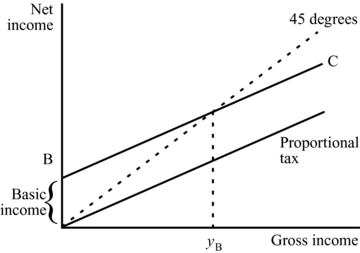Figure 1 Basic Income: Flat Tax

Figure 2 The Government's Budget Constraint

Figure 3 Optimal Tax Rate

Figure 4 Maximum Tax Rate

Figure 5 Marginal Tax Rate on Top Income
 For the Student- Personal Income Taxation: From Theory to Policy
For the Student- Personal Income Taxation: From Theory to Policy;
The main change in the approach to taxation came from the later integration of public finance into the general area of welfare economics, which was itself a major concomitant of the successful introduction of a utility-maximising approach to exchange in the 1870s. However, the most systematic early developments came from Cohen-Stuart in 1889 (Cohen-Stuart 1958) and Edgeworth (1897) in investigating the broad implications for progressivity of the minimisation of total disutility from taxation—ignoring any possible benefits. With the criterion of minimising total sacrifice, progression arises from decreasing marginal utility, but with equal absolute sacrifice, it depends on the precise behaviour of the marginal utility of income. Even here, there was no explicit independent role for redistribution: the maximand was strictly considered to be total utility.
This movement reached its ultimate conclusion in the 'optimal tax' literature, beginning virtually a century after the initial introduction of a utility analysis into economics. The mathematical analyses of Edgeworth were extended by allowing, in particular, for labour supply incentive effects of taxes and transfers, and including a range of specifications of the objectives of taxation, thus introducing an explicit redistributive role.8 In this final development, most of the important criteria suggested by Smith and others were ignored. The relevant branch of welfare economics into which optimal tax theory falls is the theory of the 'second best', in view of the fact that the government is unable to tax individuals' endowments of ability and instead taxes their incomes. Sometimes, stress is placed on asymmetric information aspects, in that the government cannot observe ability levels




